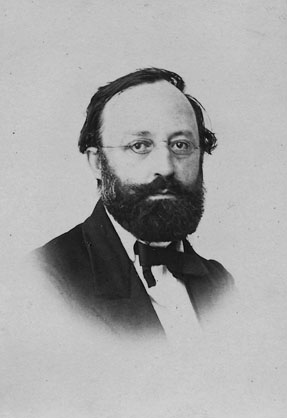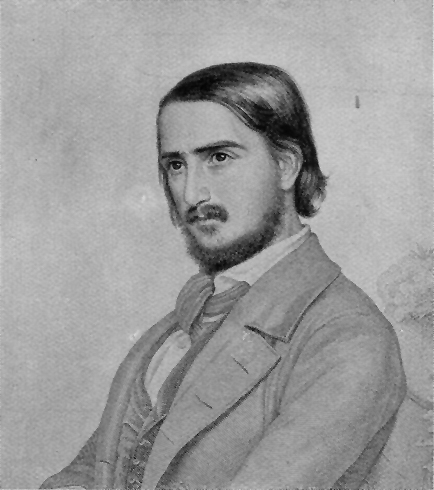|
Julius Fröbel
Carl Ferdinand Julius Fröbel (16 July 1805 – 7 November 1893) was a German geologist and mineralogist, journalist, and democratic revolutionary already during the ''Vormärz'' era. He was active in Germany, Switzerland, the United States and South America at different times in his life. Biography He was born in the Thuringian village of Griesheim (today part of the Ilmtal municipality), the son of pastor Johann Michael Christoph Fröbel (d. 1813) and his wife Christiane Sopie. He attended the educational institute of his uncle Friedrich Fröbel, the founder of the kindergarten system, and continued his studies of natural sciences at the universities of Jena, Munich, and Berlin. By the agency of Alexander von Humboldt, Fröbel took up a teaching position in Zürich in 1833 and became a naturalized citizen of Switzerland. From 1836, he taught mineralogy at the University of Zürich. In 1838 he married his first wife Kleophea, née Zeller. Upon the reactionary Züriputsch in 18 ... [...More Info...] [...Related Items...] OR: [Wikipedia] [Google] [Baidu] |
Carl Ferdinand Julius Fröbel
Carl may refer to: *Carl, Georgia, city in USA *Carl, West Virginia, an unincorporated community *Carl (name), includes info about the name, variations of the name, and a list of people with the name *Carl², a TV series * "Carl", List of Aqua Teen Hunger Force episodes, an episode of television series ''Aqua Teen Hunger Force'' * An informal nickname for a student or alum of Carleton College CARL may refer to: *Canadian Association of Research Libraries *Colorado Alliance of Research Libraries See also *Carle (other) *Charles *Carle, a surname *Karl (other) *Karle (other) {{disambig ja:カール zh:卡尔 ... [...More Info...] [...Related Items...] OR: [Wikipedia] [Google] [Baidu] |
Bruno Bauer
Bruno Bauer (; 6 September 180913 April 1882) was a German philosopher and theologian. As a student of G. W. F. Hegel, Bauer was a radical Rationalism, Rationalist in philosophy, politics and Biblical criticism. Bauer investigated the sources of the New Testament and, beginning with Hegel's Hellenophile orientation, concluded that early Christianity owed more to Ancient Greece, ancient Greek philosophy (Stoicism) than to Judaism. Bruno Bauer is also known for his association and sharp break with Karl Marx and Friedrich Engels, and by his later association with Max Stirner and Friedrich Nietzsche. Starting in 1840, he began a series of works arguing that Jesus, Jesus of Nazareth was a 2nd-century fusion of Jewish, Greek, and Roman theology.Will Durant, Durant, Will. Caesar and Christ. New York: Simon and Schuster. 1972 Biography Bauer was the son of a painter in a porcelain factory and his wife at Eisenberg, Thuringia, Eisenberg in Saxe-Gotha-Altenburg. He studied at the Humbol ... [...More Info...] [...Related Items...] OR: [Wikipedia] [Google] [Baidu] |
Frankfurt Parliament
The Frankfurt Parliament (german: Frankfurter Nationalversammlung, literally ''Frankfurt National Assembly'') was the first freely elected parliament for all German states, including the German-populated areas of Austria-Hungary, elected on 1 May 1848 (see German federal election, 1848). The session was held from 18 May 1848 to 31 May 1849, in the Paulskirche at Frankfurt am Main. Its existence was both part of and the result of the "March Revolution" within the states of the German Confederation. After long and controversial debates, the assembly produced the so-called Frankfurt Constitution (''Paulskirchenverfassung'' or St. Paul's Church Constitution, officially the ''Verfassung des Deutschen Reiches'') which proclaimed a German Empire based on the principles of parliamentary democracy. This constitution fulfilled the main demands of the liberal and nationalist movements of the Vormärz and provided a foundation of basic rights, both of which stood in opposition to Metterni ... [...More Info...] [...Related Items...] OR: [Wikipedia] [Google] [Baidu] |
Revolutions Of 1848 In Germany
In political science, a revolution (Latin: ''revolutio'', "a turn around") is a fundamental and relatively sudden change in political power and political organization which occurs when the population revolts against the government, typically due to perceived oppression (political, social, economic) or political incompetence. Revolutions have occurred throughout human history and vary widely in terms of methods, duration, and motivating ideology. Their results include major changes in culture, economy, and socio-political institutions, usually in response to perceived overwhelming autocracy or plutocracy. Scholarly debates about what does and does not constitute a revolution center on several issues. Early studies of revolutions primarily analyzed events in European history from a psychological perspective, but more modern examinations include global events and incorporate perspectives from several social sciences, including sociology and political science. Several generation ... [...More Info...] [...Related Items...] OR: [Wikipedia] [Google] [Baidu] |
Kingdom Of Saxony
The Kingdom of Saxony (german: Königreich Sachsen), lasting from 1806 to 1918, was an independent member of a number of historical confederacies in Napoleonic through post-Napoleonic Germany. The kingdom was formed from the Electorate of Saxony. From 1871, it was part of the German Empire. It became a free state in the era of Weimar Republic in 1918 after the end of World War I and the abdication of King Frederick Augustus III of Saxony. Its capital was the city of Dresden, and its modern successor state is the Free State of Saxony. History Napoleonic era and the German Confederation Before 1806, Saxony was part of the Holy Roman Empire, a thousand-year-old entity that had become highly decentralised over the centuries. The rulers of the Electorate of Saxony of the House of Wettin had held the title of elector for several centuries. When the Holy Roman Empire was dissolved in August 1806 following the defeat of Emperor Francis II by Napoleon at the Battle of Austerlitz, th ... [...More Info...] [...Related Items...] OR: [Wikipedia] [Google] [Baidu] |
Dresden
Dresden (, ; Upper Saxon: ''Dräsdn''; wen, label=Upper Sorbian, Drježdźany) is the capital city of the German state of Saxony and its second most populous city, after Leipzig. It is the 12th most populous city of Germany, the fourth largest by area (after Berlin, Hamburg and Cologne), and the third most populous city in the area of former East Germany, after Berlin and Leipzig. Dresden's urban area comprises the towns of Freital, Pirna, Radebeul, Meissen, Coswig, Radeberg and Heidenau and has around 790,000 inhabitants. The Dresden metropolitan area has approximately 1.34 million inhabitants. Dresden is the second largest city on the River Elbe after Hamburg. Most of the city's population lives in the Elbe Valley, but a large, albeit very sparsely populated area of the city east of the Elbe lies in the West Lusatian Hill Country and Uplands (the westernmost part of the Sudetes) and thus in Lusatia. Many boroughs west of the Elbe lie in the foreland of the Ore Mounta ... [...More Info...] [...Related Items...] OR: [Wikipedia] [Google] [Baidu] |
Gottfried Keller
Gottfried Keller (19 July 1819 – 15 July 1890) was a Swiss poet and writer of German literature. Best known for his novel '' Green Henry'' (German: ''Der grüne Heinrich'') and his cycle of novellas called ''The People from Seldwyla'' (''Die Leute von Seldwyla''), he became one of the most popular narrators of literary realism in the late 19th century. Early life His father was Rudolf Keller (1791–1824), a lathe-worker from Glattfelden; his mother was a woman named Elisabeth Scheuchzer (1787–1864). The couple had six children, four of whom died, meaning Keller only had his sister Regula (*1822) left. After his father died of tuberculosis, Keller's family lived in constant poverty, and, because of Keller's difficulties with his teachers, in continual disagreement with school authorities. Keller later gave a good rendering of his experiences in this period in his long novel, ''Der grüne Heinrich'' (1850–55; 2nd version, 1879). His mother seems to have brought him up in as ca ... [...More Info...] [...Related Items...] OR: [Wikipedia] [Google] [Baidu] |
Hoffmann Von Fallersleben
August Heinrich Hoffmann (, calling himself von Fallersleben, after his hometown; 2 April 179819 January 1874) was a German poet. He is best known for writing "Das Lied der Deutschen", whose third stanza is now the national anthem of Germany, and a number of popular children's songs, considered part of the Young Germany movement. Biography Hoffmann was born in Fallersleben in Lower Saxony, then in the duchy of Brunswick-Lüneburg. The son of a merchant and mayor of his native city, he was educated at the classical schools of Helmstedt and Braunschweig, and afterwards at the universities of Göttingen and Bonn. His original intention was to study theology, but he soon devoted himself entirely to literature. In 1823 he was appointed custodian of the university library at Breslau, a post which he held till 1838. He was also made extraordinary professor of the German language and literature at that university in 1830, and ordinary professor in 1835. Hoffmann was deprived of ... [...More Info...] [...Related Items...] OR: [Wikipedia] [Google] [Baidu] |
Georg Herwegh
Georg Friedrich Rudolph Theodor Herwegh (31 May 1817 – 7 April 1875) was a German poet,Herwegh, Georg, The Columbia Encyclopedia (2008) who is considered part of the Young Germany movement. Biography He was born in Stuttgart on 31 May 1817, the son of an innkeeper. He was educated at the Gymnasium Illustre of Stuttgart, and in 1835 proceeded to the University of Tübingen as a theological student, where, with a view to entering the ministry, he entered the Protestant theological seminary. However, he found the strict discipline distasteful; he broke the rules and was expelled in 1836. He studied law for a short time, but decided to return to Stuttgart, and became editor of August Lewald's periodical ''Europa''. Called out for military service, he had hardly joined his regiment when he became embroiled with a military officer with an act of insubordination, and had to flee to Emmishofen, Switzerland in 1839. His ''Gedichte eines Lebendigen'' ("Poems of a living man") were publ ... [...More Info...] [...Related Items...] OR: [Wikipedia] [Google] [Baidu] |
David Strauss
David Friedrich Strauss (german: link=no, Strauß ; 27 January 1808 – 8 February 1874) was a German liberal Protestant theologian and writer, who influenced Christian Europe with his portrayal of the "historical Jesus", whose divine nature he denied. His work was connected to the Tübingen School, which revolutionized study of the New Testament, early Christianity, and ancient religions. Strauss was a pioneer in the historical investigation of Jesus. Early life He was born in Ludwigsburg, near Stuttgart. At age 12 he was sent to the evangelical seminary at Blaubeuren, near Ulm, to be prepared for the study of theology. Two of the principal masters in the school were Professors Friedrich Heinrich Kern (1790–1842) and Ferdinand Christian Baur, who instilled in their pupils a deep appreciation for the ancient classics and the principles of textual criticism, which could be applied to texts in the sacred tradition as well as to classical ones. In 1825, Strauss entered the ... [...More Info...] [...Related Items...] OR: [Wikipedia] [Google] [Baidu] |
Friedrich Wilhelm Schulz
Friedrich Wilhelm Schulz (often known as ''Wilhelm Schulz'' or after his second marriage ''Wilhelm Schulz-Bodmer''; 13 March 1797 in Darmstadt – 9 January 1860 in Hottingen (Zürich), Hottingen) was a German officer, political writer and radical liberal publisher in Hesse. His most famous works are ''Der Tod des Pfarrers Friedrich Ludwig Weidig'' (''The Death of Pastor Friedrich Ludwig Weidig.'') as well as ''Die Bewegung der Produktion'' (''Movement of Production''), which Karl Marx quoted extensively in his 1844 Manuscripts. Schulz was the first to describe the movement of society "as flowing from the contradiction between the forces of production and the mode of production," which would later form the basis of historical materialism. Marx continued to praise Schulz's work decades later when writing ''Das Kapital''. Life He was a friend of Georg Büchner and an early follower of Pierre-Joseph Proudhon. Convicted as a demagogue, he escaped from prison in 1834 and emigra ... [...More Info...] [...Related Items...] OR: [Wikipedia] [Google] [Baidu] |





